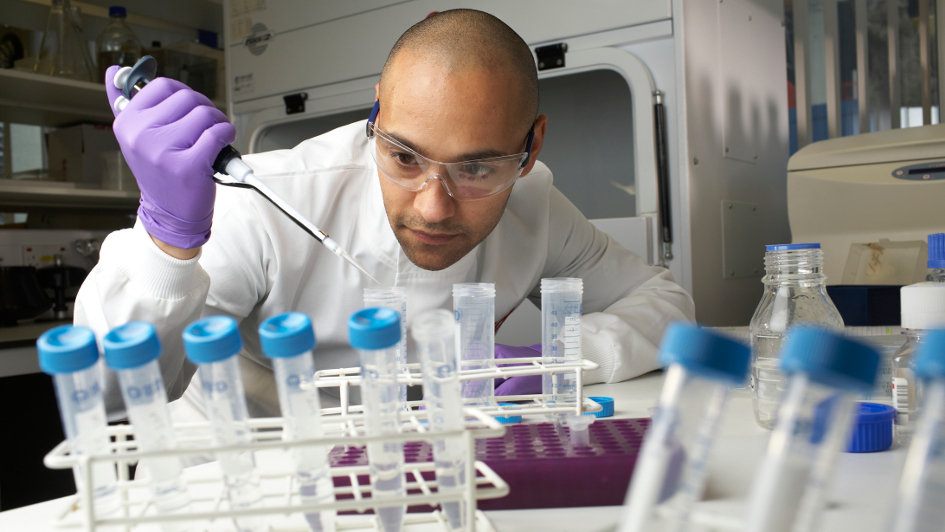
This year is the 70th anniversary of the NHS. Since the introduction of universal health care in 1948, the NHS has saved the lives of millions of people and benefited countless more in so many ways.
Part of what makes the NHS so important is the research carried out within it to keep improving treatment and care. Every year, more than half a million people help the NHS to improve healthcare and develop life-saving treatments by taking part in health research.
In the run-up to its 70th birthday on Thursday 5 July 2018, the NHS is celebrating how research has improved health and care over the past 70 years, and how research is helping to shape the future.
The NIHR’s I Am Research campaign will showcase 70 discoveries that have transformed the way the NHS works and improved outcomes for patients. Three research discoveries made at the ICR have been highlighted as part of their list of greatest discoveries.
We have an outstanding record of scientific achievement dating back more than 100 years. Our most influential discoveries have played an important role in shaping our modern understanding of cancer and how it can be treated.
Read more
Intensity modulated radiotherapy treatment
The ICR and The Royal Marsden NHS Foundation Trust have been pioneers in developing new forms of high-precision radiotherapy techniques, which have transformed clinical treatment for cancer.
Intensity-modulated radiotherapy (IMRT) delivers precise doses of radiation shaped to patients' tumours, resulting in less damage to healthy tissue, and allowing higher intensities of radiation to be concentrated on the tumour.
ICR researchers played a significant role in defining the volume distribution of radiation doses to the body – a key advancement in radiotherapy technology leading to safer, more effective treatment for patients.
Our research has established IMRT as the standard of care in the UK for many types of cancer including prostate cancer and head and neck cancer, and also demonstrated how it can reduce the severity of side-effects from radiotherapy treatment, enabling smarter, kinder treatments.
Professor Kevin Harrington’s research showed IMRT can help avoid the risk of dry mouth in patients treated for head and neck cancers. We have also shown that the technique is suitable for elderly patients with bladder cancer who are too frail for more aggressive forms of treatment.
The NIHR will be sharing one discovery a day on their Twitter account @OfficialNIHR and on the I Am Research campaign page.
You can use the hashtags #70discoveries #nhs70 #IAmResearch on social media to celebrate 70 years of the most important research discoveries in healthcare.
Abiraterone for prostate cancer
The prostate cancer drug abiraterone is one of the ICR’s biggest success stories – the first treatment shown to be effective in men with advanced prostate cancer.
For men with prostate cancer that has stopped responding to other types of hormone therapy – but who haven't yet had chemotherapy – abiraterone has been shown to significantly extend life.
The drug has also been approved for use with standard hormone therapy as a first-line treatment for advanced prostate cancer.
The treatment was discovered at the ICR and developed jointly with The Royal Marsden.
ICR scientists proposed that the malignant growth of certain prostate cancers was driven by the production of male sex hormones called androgens in the body.
In the 1990s, drug discovery research at the ICR identified abiraterone as a compound that could inhibit the synthesis of testosterone
Professor Johann de Bono and his team at the ICR and The Royal Marsden carried out the initial clinical development of the drug as well as leading the later-stage international clinical trials including the first trial that led to regulatory approval.
Abiraterone has been available on the NHS since 2012 and could benefit more than 10,000 British men with prostate cancer each year. It’s also being tested for other cancers, so it could help even more patients soon.
Smoking linked to lung cancer
Proving the link between smoking and lung cancer was the collaborative effort of many researchers, but the ICR helped identify many cancer-causing chemicals in cigarette smoke and coal tar.
In the 1920s and 1930s Professor Sir Ernest Kennaway, Director of The Cancer Hospital Research Institute which would later become the ICR, worked meticulously with his team to separate the constituents of coal tar and test them to see whether they caused cancer in mice.
They found that the cancer-causing agents were chemicals called polycyclic aromatic hydrocarbons (PAHs). They identified the first pure compound to be shown to have cancer-causing properties, which is also found in cigarette smoke.
Professor Kennaway’s discovery was a major breakthrough and in 1941 he was awarded the Royal Society’s Royal Medal for his work.
The world renowned epidemiologist Sir Richard Doll, who went on to be the Chairman of the ICR, was also instrumental in linking smoking to lung cancer.
In the 1950s Sir Richard Doll studied cancer patients from London hospitals. His landmark research found that the risk of developing lung cancer increased in proportion to the amount smoked, confirming the link between smoking and lung cancer.
Sir Richard Doll’s contribution to cancer research and improving public health were huge, and we named a building after him in 2005. He is also celebrated by the NHS as one of their legends of health research.
comments powered by